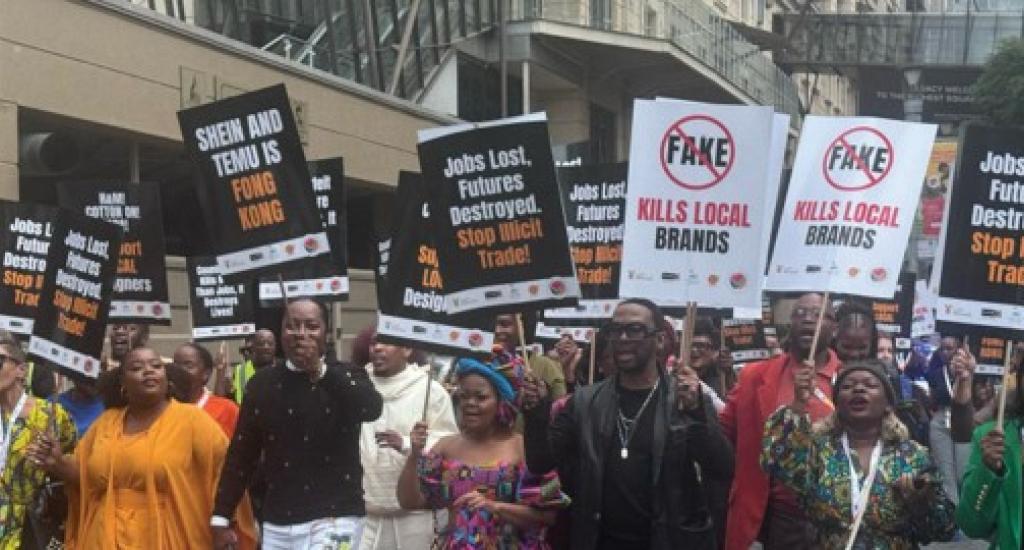MSMEs and cooperatives
crucial for economic growth and job creation

Government has affirmed micro, small and medium enterprises (MSMEs) and cooperatives as key drivers of economic growth and job creation in South Africa.
This is according to Small Business Development Director-General (DG) Thulisile Manzini, who believes that a well-organised ecosystem can establish and recognise the foundation for industrialisation and localisation in the country. “MSMEs and cooperatives bring flexibility in the economy against worldwide economic fluctuations,” she explained during the 2025 edition of the Buy Local Summit and Expo, where she was a keynote speaker.
The event, which was held in March 2025, has proven to become the premier buy local exposition.
Led by Proudly South African (Proudly SA) and touted as the country’s largest local procurement gathering, this year’s event featured over 200 exhibitors, spanning diverse industries from information and communication technology, textile, automotive, cosmetics and personal care, beverages, confectionary, food and gaming industries.
A winning formula
Manzini said the Buy Local campaign, together with the Department of Small Business Development’s (DSBD) strategic mandate for small enterprise development, infused with forward-looking policy instruments such as the Localisation Policy Framework, are a perfect combination of a winning formula.
The DG added that the gathering should mark the beginning of bigger business for participants.
“Business connections, which will be made during this event, although happening on home soil, should be seen as opportunities to launch all willing small enterprises into bigger markets, with our eyes firmly set on regional and international markets.”
She encouraged all producers and manufactures to source their inputs and production equipment locally.
“This is the only way this sector will succeed in not only disrupting the prevailing patterns... it is a sure way to guarantee success in achieving equality of opportunity and igniting the economy as envisaged in our national development framework,” she added.
Manzini highlighted that growth in the country remains sub-optimal, due to three main factors: binding constraints, which the DSBD is tackling through Operation Vulindlela; the economy’s heavy reliance on commodities exports, which the department is addressing through industrial policy to di- versify and increase productivity in new sectors; and the low economic growth, as many citizens are not participating in productive economic activities.
“We must get more people working and self-employed as entrepreneurs. We need more job creators rather than job seekers. More focus on entrepreneurship and MSMEs will also help address the unemployment challenges,” added the DG.
According to Statistics South Africa, official unemployment rate decreased to 32.1% in the third quarter to 31.9% in quarter four of 2024.
The number of unemployed individuals dropped slightly to 7.991 million, while employment gains were observed in finance and manufacturing.
Despite the positive trajectory, the DG noted that unemployment remains a significant challenge in the country.
Supporting small businesses
“Government, through the National Development Plan (NDP), recognises the role of MSMEs and cooperatives in creating employment opportunities and reducing poverty.
As such, the department continues to support the development, promotion, and sustainability of MSMEs and cooperatives to expedite the attainment of the NDP goals,” said Manzini.
She added that this ideal is not pursued in isolation, as government recognises the valuable participation and contribution of key players within the small business development ecosystem, such as Proudly SA.
Furthermore, Manzini said government seeks to rebuild the productive economy, create jobs and transform the ownership structure of the country’s economy – a necessary move in fostering inclusivity, particularly regarding the role of MSMEs and cooperatives in driving economic growth and job creation.
“It is, therefore, befitting that the DSBD was assigned the responsibility to develop and propose a localisation policy in the 2019 – 2024 Medium Term Strategic Framework, with the view to advance the interest of MSMEs and cooperatives towards full, local manufacturing capacity,” she explained.
The MSME-focused Localisation Policy Framework for South Africa was approved by Cabinet in October 2019.
Collaboration Manzini said the department is pleased to have officially partnered with Proudly SA towards enhancing the growth and development of MSMEs and cooperatives, using localisation as a lever to facilitate market access.
“One of the key objectives of our collaboration is to utilise the Buy Local Summit and Expo platform to provide small enterprises with an opportunity to showcase their locally made products, network through the business-to-business match-making programme, ensuring that they benefit from the import replacement imperative, as well as utilising the Business Solutions Hub to solidify support towards the growth and success of their businesses,” Manzini explained.
One of the key initiatives that the department uses to empower MSMEs is the Small Enterprise Manufacturing Support Programme (SEMSP), which aims to strengthen the manufacturing sector and enhance the industrial base (productive economy) through a targeted import replacement programme.
The SEMSP also aims to build the industrial base for both the domestic market and external markets with particular focus on the African Union market.
Expanding market access
Manzini said the initiative is part of the department’s efforts to expand market access within corporate supply chains and to facilitate export readiness programmes, helping small businesses compete on a global scale.
She added that the establishment of the Small Enterprise Development and Finance Agency (Sedfa) streamlines
financial and developmental support for MSMEs.
As of 1 October 2024, the Small Enterprise Finance Agency, the Small Enterprise Development Agency, and the Cooperative Banks Development Agency have officially merged to form the Sedfa.
The agency is a unified institution dedicated to supporting the growth and development of MSMEs across South Africa.
Sector master plans
The DG also reflected on the achievements of the reimagined industrial strategy introduced in 2019.
“A key component of this strategy has been the development of sector master plans, designed to enhance competitiveness, build resilience and drive sustainable economic growth. These plans have played a crucial role in strengthening key industries, supporting businesses and fostering job creation,” she explained.
The plans are being implemented by the private sector, including small enterprises, and government across various industries such as automotives, clothing, textile, footwear and leather, poultry, sugar, steel and metal fabrication, and furniture. The focus is on reducing imports, improving competitiveness and efficiency and facilitating economic inclusion.
“We will leverage our relationship with Proudly SA to identify small enterprises who participate in these key industries and ensure that they are supported through access to information and through linkages to established industry players so that they benefit from this partnership in a very tangible, sustainable and impactful way,” she said.
She added that the DSBD has already developed monitoring and reporting tools that will provide insights on whether their joint plans and objectives are being met.
Furthermore, Manzini said the participation of MSMEs and cooperatives in key sectors of the economy offers numerous benefits, including making a significant contribution to labour-intensive employment, improving efficiency and promoting better income distribution.
“All these benefits and more, are at the centre of government’s socio-economic imperative to broadly disseminate the benefits accrued from economic growth,” said the DG.




